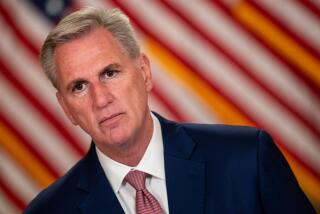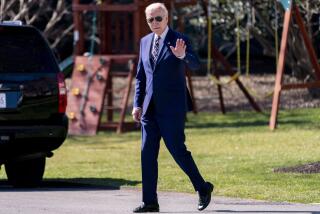Bush Puts Food, Jobs in Budget
- Share via
WASHINGTON — President Bush said Saturday that his budget will propose funding increases for popular nutrition and job-training programs, likely exceptions in a fiscal plan that will see a return to federal deficits.
The budget will call for an additional $364 million for the $4.3-billion Women, Infants and Children nutrition program and $73 million more for the Job Corps, currently funded at $1.5 billion, the president said in his weekly radio address.
Bush’s budget of more than $2 trillion for the 2003 fiscal year will be presented to Congress on Feb. 4.
Such social welfare programs are not usually a priority for Republicans. Indeed, Bush emphasized that defense, homeland security and a renewed debate over tax cuts to spur the economy remain his leading concerns. But he is also trying to avoid the political misfortunes that befell his father, who as president was labeled as insensitive to the plight of Americans in an economic downturn and lost his reelection bid in 1992.
“My budget focuses on the pressing needs of our country and on the basic needs of our citizens,” Bush said in his Saturday speech. “I am committed to building a strong economy that spreads its benefits to everyone.”
In the Democratic response, Rep. Mike Ross (D-Ark.) said GOP priorities are tilted toward “big corporations and special interests” and called on Bush to “find common ground” on domestic policy as he has in the war on terrorism.
Democrats are pressing for more generous benefits for laid-off workers--including help in paying for health insurance. And they favor more modest tax cuts, aimed at middle- and low-income workers.
Last Monday, Bush began preparing the public for a red-ink budget on the heels of several years of surpluses. “We had a national emergency, we’re trying to win a war and we’re in a recession. . . . We may not balance the budget for this year,” he told reporters.
The Democratic staff of the House Budget Committee has projected that the 2003 deficit will be at least $43 billion. The analysis also forecast a $3-billion deficit for the current fiscal year, which ends Sept. 30.
Democrats are increasingly blaming the vanishing surplus on Bush’s 10-year, $1.35-trillion tax cut passed in May. In a speech scheduled for Wednesday, Sen. Edward M. Kennedy (D-Mass.) is expected to raise the stakes in the debate by calling for suspending parts of the tax cut law that benefit upper-income individuals, according to a source familiar with Kennedy’s plans.
Other Democratic congressional leaders so far have resisted proposing such changes, even as they have increased criticism of the tax cut’s effect on the budget.
The two programs cited by Bush in his radio address enjoy a rare level of bipartisan support. WIC provides food, health screenings and other services to low-income pregnant women, new mothers and their children under age 5. In August, nearly 7.5 million people were receiving benefits through the program. Bush said the additional funds would allow WIC to serve 8 million people.
Job Corps is a training program for low-income teenagers and young adults, with most of its clients coming from urban centers and rural areas. Trainees live away from home and receive classroom and on-the-job instruction. Job Corps has trained nearly 2 million people since it was started in the 1960s and has a solid track record with many employers.
In an interview with Associated Press, White House Budget Director Mitchell E. Daniels Jr. said the administration estimates the 2003 budget deficit at less than $100 billion, but he didn’t give a specific figure.
Daniels said the budget will call for significant increases in military and domestic security spending. The $15-billion increase in domestic security would double such spending in this year’s budget.
Much of the homeland security spending will go to a new Transportation Security Administration, which will employ more than 30,000 people and have responsibility for air, seaport, rail and roadway counter-terrorism efforts. Bush also will call for higher funding levels for law enforcement agencies and public health programs.
Overall, Bush is expected to propose a 3.4% spending increase for defense and most domestic programs, meaning that some agencies will have to absorb sharp cuts to make room for the spending increases. However, benefits for Social Security, Medicare and Medicaid are set by law and not subject to annual funding decisions.
With bad news such as Ford Motor Co.’s announcement Friday that it will cut 35,000 jobs still looming over prospects for an economic recovery, Bush has been seeking to steer his focus on economic policy. On Monday, he will begin a three-day swing from Illinois to New Orleans to tout his free-trade proposals as a way to create jobs.
More to Read
Get the L.A. Times Politics newsletter
Deeply reported insights into legislation, politics and policy from Sacramento, Washington and beyond. In your inbox twice per week.
You may occasionally receive promotional content from the Los Angeles Times.










